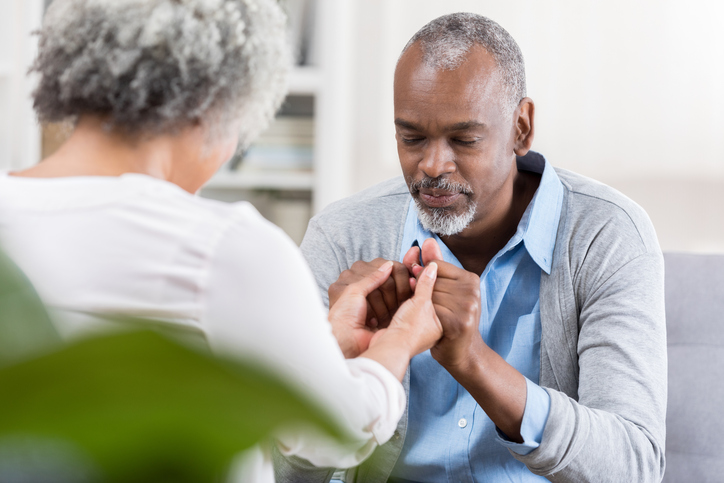 Agoraphobia is a phobia of being trapped in difficult-to-escape situations. One person may dread being alone in an open space where they cannot get help if needed. Another person might avoid crowded public areas that they cannot easily leave.
Agoraphobia is a phobia of being trapped in difficult-to-escape situations. One person may dread being alone in an open space where they cannot get help if needed. Another person might avoid crowded public areas that they cannot easily leave.
Agoraphobia can restrict one’s day-to-day living. People may go far out of their way to avoid certain places. Some may rely on others to accompany them out of the house. In severe cases, people may confine themselves at home.
Without treatment, only 10% of people with agoraphobia completely recover. With treatment, most individuals can overcome the condition. People who have agoraphobia can benefit from speaking with a therapist. Those who have difficulty leaving their house may find home-based or distance therapy helpful.
- How to Get Help for Agoraphobia
- Therapy for Agoraphobia
- Medication for Agoraphobia
- Self-Help for Agoraphobia
- Helping a Loved One with Agoraphobia
- Case Example of Therapy for Agoraphobia
HOW TO GET HELP FOR AGORAPHOBIA
Traveling to a therapist's office can pose a challenge for some people with agoraphobia. Some therapists may be willing to meet in a neutral place where you feel safe. For example, if you are afraid of public transportation, you could have therapy sessions at a park within walking distance.
If you are unable to leave your home, you may find distance therapy or home-based therapy helpful.
- In distance therapy, you and a therapist speak indirectly via phone, email, or video chat. Some people appreciate the convenience of distance therapy. Yet others find the lack of nonverbal communication makes it more difficult to connect with the therapist.
- In home-based therapy, the therapist holds sessions within your home. Home-based therapy can combine the convenience of distance therapy with a face-to-face connection. Yet the environment may also have more distractions (fussy infant, loud neighbors) than an office visit.
If you are curious whether a therapist offers a specific type of therapy, you can call them and ask for a free consultation. If a particular therapist cannot treat you, they will likely refer you to someone who can.
THERAPY FOR AGORAPHOBIA
A therapist can talk you through the thoughts and feelings that contribute to agoraphobia. Through therapy, you can explore strategies to approach feared situations. A therapist may also teach you personalized exercises to prevent and cope with panic.
- Cognitive behavioral therapy (CBT) is often used to treat agoraphobia. This type of therapy can be helpful in managing the thoughts that cause agoraphobia. Through CBT, you can learn how to recognize unrealistic or distorted thoughts in the heat of the moment. You can also practice countering those thoughts with a more balanced viewpoint.
- Exposure therapy can also treat agoraphobia. In this type of therapy, a therapist introduces you to a feared situation in small steps. If you fear enclosed spaces, you may start by looking at a tunnel, then standing just outside a tunnel, then taking a few steps inside, and so on. The therapist will be with you each step of the way, ready to assist if your anxiety grows too strong. With each step, you will ideally become desensitized to the tunnel and stop fearing it as much.
Each type of therapy has its pros and cons. Some therapists may deploy multiple types of therapy as the situation requires.
MEDICATION FOR AGORAPHOBIA
A psychiatrist may prescribe you medication for agoraphobia. Selective serotonin reuptake inhibitors (SSRIs) are the most commonly prescribed drug. Yet some people report side effects while starting and ending an SSRI regimen. Some of these side effects, such as nausea or dizziness, can resemble panic attacks. If these side effects cause distress, you may need to switch to another medication.
If you have severe anxiety symptoms, a doctor may prescribe you an anti-anxiety medication called a benzodiazepine. Due to their habit-forming tendencies, benzodiazepines are generally used for temporary relief rather than long-term treatment.
SELF-HELP FOR AGORAPHOBIA
Lifestyle changes are unlikely to cure agoraphobia. Yet there are ways you can help yourself cope with symptoms while you are looking for treatment.
- As with any mental health concern, self-care is important. Exercise, sleep, and a balanced diet can all improve mental health.
- Relaxation techniques such as visualization can help you calm down more quickly. If you practice relaxing in a safe setting, you may be able to do it easier in stressful situations.
- Since caffeine can increase anxiety symptoms, you may wish to limit your coffee intake.
- Support groups for agoraphobia can provide advice and sympathy. Online groups can offer much-needed social interaction for people isolated at home.
HELPING A LOVED ONE WITH AGORAPHOBIA
 If you have a loved one with agoraphobia, you can play an important role in treatment. Emotional support is often crucial to recovery. Although you may not understand why your loved one is so afraid, it is important not to belittle or scold them. Telling someone that their fears are “all in their head” is unlikely to help. Just because a person’s symptoms are psychological does not mean they are fake.
If you have a loved one with agoraphobia, you can play an important role in treatment. Emotional support is often crucial to recovery. Although you may not understand why your loved one is so afraid, it is important not to belittle or scold them. Telling someone that their fears are “all in their head” is unlikely to help. Just because a person’s symptoms are psychological does not mean they are fake.
In some cases, your loved one may push themselves into situations they are not ready for. If you are present when they have a panic attack, here are some tips to help:
- Offer sympathy, not judgement. Chances are that your loved one already knows their anxiety is disproportionate to the situation. Reminding them of this fact is likely to increase their frustration and stress, not reduce it.
- Assure the person that they can get through this panic attack. Symptoms such as chest pains can make a person feel as if they are dying, but panic attacks are not lethal.
- If possible, lead the person out of the stressful situation. For example, if the panic started after entering a crowded shop, taking the person to a more secluded area may help.
During treatment, your loved one may have good days and bad days. Recovery is a journey, not a race. It is important to be patient with your loved one. Forcing an individual to confront their fears without proper support is likely to backfire. It could even damage your relationship. When your loved one does make a step toward recovery, even a small one, acknowledging their courage can inspire them to keep trying.
CASE EXAMPLE OF THERAPY FOR AGORAPHOBIA
- Agoraphobia resulting from a traumatic experience: Naomi, 26, makes an appointment to speak to a therapist at her mother’s suggestion. She experienced a panic attack seven months ago, shortly after being mugged on the train. Since then Naomi has been unable to take the train and dreads going out in public. She has significant anxiety at the thought of being mugged again or of becoming ill in a public place. Because Naomi can no longer commute to work on the train, she gets up two hours earlier each day to take her mother to work and borrow her car. Naomi insists her mother or best friend accompany her when she must go out. In general, Naomi only ventures out when it is absolutely necessary. In her sessions with the therapist, Naomi opens up about her fears, namely, the terror and panic she experienced while being mugged. With her therapist, she discusses things that might help her feel more able to go out in public. She decides to attempt to use public transportation while accompanied by someone. By the fourth session, she is able to take the train to her therapist’s office. Although Naomi experiences some anxiety on the train, the fear is not crippling. Naomi continues to see the therapist, and her anxiety continues to decrease.
If you or a loved one is seeking help for agoraphobia, you can find a therapist here.
References:
- Agoraphobia. (2011, April 21). Mayo Clinic. Retrieved from https://www.mayoclinic.org/diseases-conditions/agoraphobia/symptoms-causes/syc-20355987
- American Psychiatric Association. (2013). Diagnostic and statistical manual of mental disorders (5th ed.). Arlington, VA: American Psychiatric Publishing
- Flexer, S. (2018, February 6). 5 ways to help a loved one suffering from agoraphobia. Retrieved from https://www.disabilityexpertsfl.com/blog/5-ways-to-help-a-loved-one-suffering-from-agoraphobia
- McIntosh, J. (2017, December 20). What you need to know about Agoraphobia. Medical News Today. Retrieved from http://www.medicalnewstoday.com/articles/162169.php#treatment_options

